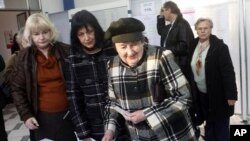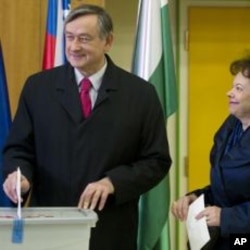Two former Yugoslav republics voted Sunday in parliamentary elections dominated by concerns about the economy and corruption. In Croatia voters are expected to unseat the conservative government, while in neighboring Slovenia conservatives are predicted to return to power.
If opinion polls are to be believed, voters in Croatia have punished the ruling conservative Croatian Democratic Union, or HDZ, in part because of rising unemployment. Voters are also angry about a series of corruption scandals within the government.
As elections campaigns were underway, Prime Minister Jadranka Kosor admitted in late October that Croatia's anti-corruption bureau launched an investigation into alleged illegal financing of her HDZ party.
That came as a setback for the HDZ, which has ruled the Balkan nation for all but four years since Croatia declared independence from what was Yugoslavia in 1991.
Voters are expected to give the center-left opposition bloc of former diplomat Zoran Milanovic of the Social Democrats a mandate to lead Croatia into the European Union in 2013.
President Ivo Josipovic acknowledges any new government will face a difficult task.
He says, “There are, of course, problems.” But, he adds, we live in the 21st century and the new government will do all it takes so Croatia can exit the economic crisis.
Croatia will be the second former Yugoslav Republic to join the European Union, after neighboring Slovenia where voters also went to the polls Sunday in their first early election since becoming independent from the former Yugoslavia two decades ago.
Slovenia's ballot was called in September after the center-left government was toppled due to economic uncertainty and allegations of corruption.
Contrary to Croatia, Slovenian voters are expected to return conservatives to power to tackle the country’s mounting debt, unemployment and a looming recession.
Opinion polls predict the Slovenian Democratic Party of former Prime Minister Janez Jansa will win a third of the votes in the country of two-million people. But analysts say he may have to seek support from smaller parties to form the majority in the 90-member parliament.





